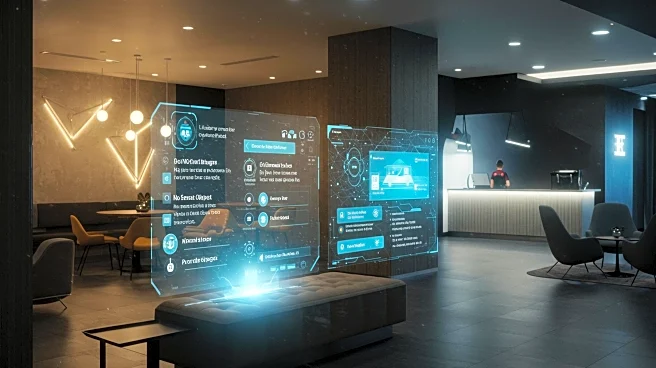What's Happening?
The hospitality industry is facing a significant challenge and opportunity with the rise of AI-driven travel planning. As travelers increasingly use AI tools like ChatGPT, Claude, and Perplexity for leisure travel planning, hotels are struggling to appear in AI-generated search results. This visibility gap is critical as 50% of travelers plan to use AI for travel within the next year. Smart hotels are addressing this by ensuring their property information is AI-readable, including real-time rates, availability, and amenities. Companies like The Hotels Network are providing solutions to make hotels discoverable and bookable by AI agents, leveraging their extensive data infrastructure to offer machine-readable content and direct booking capabilities.
Why It's Important?
The integration of AI in travel planning represents a transformative shift in the hospitality industry. Hotels that adapt to AI visibility requirements stand to gain a competitive edge by capturing a larger share of the market. This shift not only impacts booking rates but also influences how hotels are recommended by AI systems, potentially leading to increased revenue and customer engagement. The ability to offer personalized experiences at scale through AI can enhance customer satisfaction and loyalty, positioning hotels as leaders in the evolving digital landscape. Conversely, hotels that fail to adapt risk losing visibility and market share to competitors who are AI-ready.
What's Next?
Hotels need to assess their AI readiness by ensuring their data infrastructure supports AI agents. This includes structured property information, real-time data accuracy, and direct booking capabilities. The Hotels Network is working with select partners through its Connect AI early access program to enhance AI visibility and capture high-value travelers. As AI travel planning continues to grow, hotels must act quickly to implement necessary changes or risk falling behind. The industry is expected to see rapid adoption of AI technologies, with early adopters gaining significant advantages in market share and customer engagement.
Beyond the Headlines
The rise of AI in hospitality also raises questions about data privacy and ethical use of AI technologies. As hotels collect and utilize vast amounts of data to personalize experiences, they must ensure compliance with privacy regulations and ethical standards. Additionally, the shift towards AI-driven personalization may require changes in workforce skills and roles, as employees adapt to new technologies and processes. Long-term, the integration of AI could lead to more sustainable and efficient operations, reducing costs and environmental impact.










